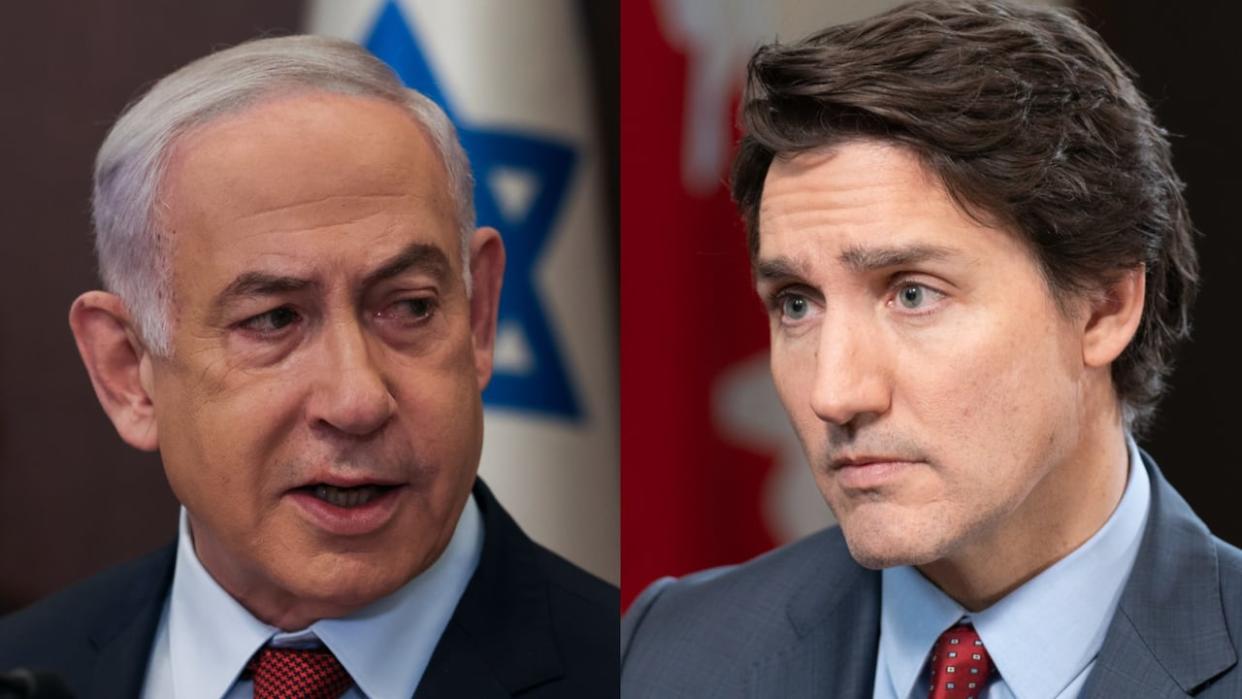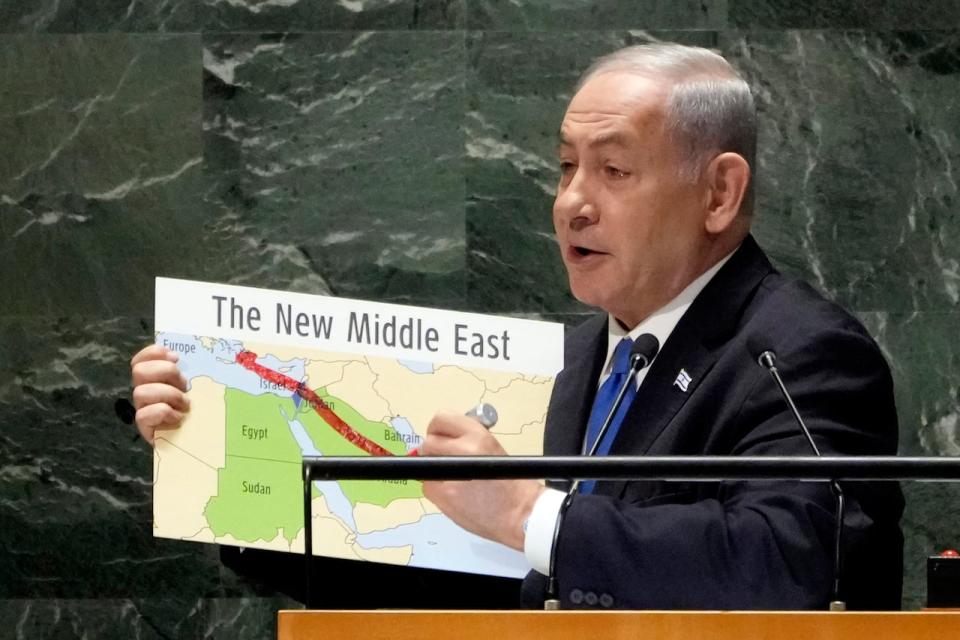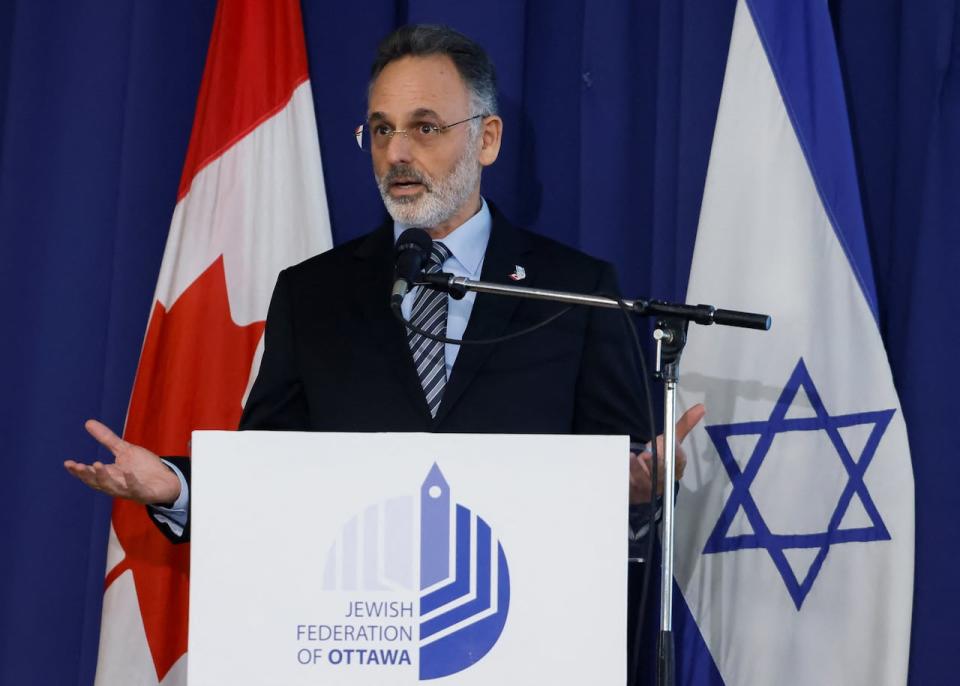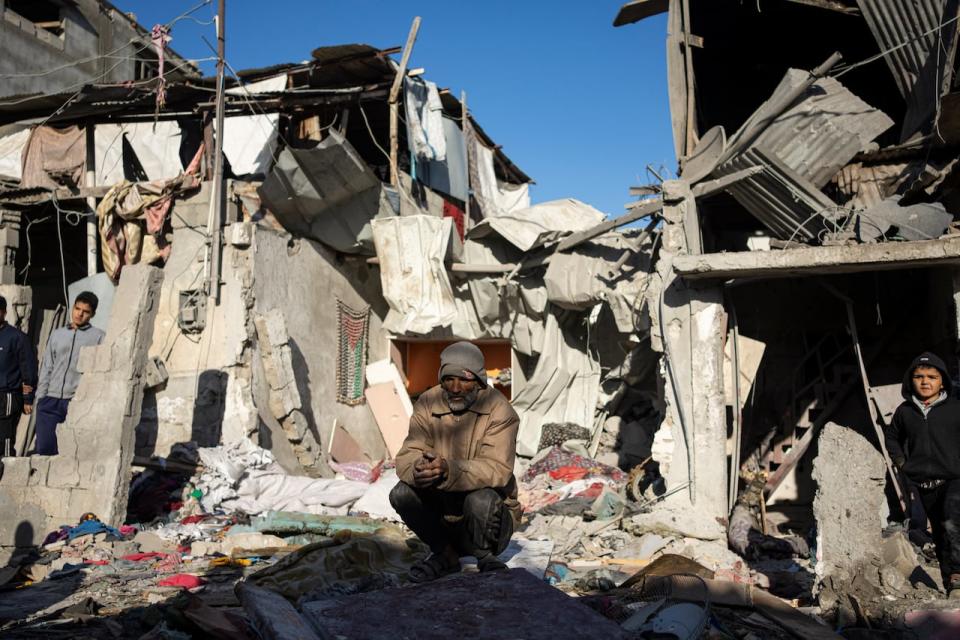Trudeau pushes back after Netanyahu again rejects two-state solution

Prime Minister Justin Trudeau criticized Benjamin Netanyahu's position on Palestinian statehood after the Israeli president claimed in a nationally-televised speech that the so-called "two-state solution" is dead.
"I was not surprised to hear Prime Minister Netanyahu share that. That has long been his position," Trudeau said Thursday when asked about the comments at a press conference in Iqaluit.
"He and I had, just a few weeks ago, an extensive conversation on exactly this topic and others.
"Canada's position is crystal clear. We believe the only way forward for the region, indeed the only way forward for a safe and secure Israel, is to have a Palestinian state that is also safe and secure with internationally-recognized borders. We believe in a two-state solution."
Netanyahu's decision to lay his cards on the table Thursday sets up a potential conflict with Israel's most important backer, U.S. President Joe Biden.
His address to the Israeli nation followed weeks of pressure by the United States to get Netanyahu's government to commit to a plan for the post-Gaza War period that includes a clear roadmap to a sovereign, independent Palestinian state.
Despite Israeli requests for Biden to stop talking about the two-state solution during the war, the American leader and his envoys have continued to insist.
All of Israel's western allies say they want to see the conflict resolved according to the principle of land-for-peace that Israel agreed to decades ago in the Oslo Accords.
Netanyahu has long opposed a two-state solution but has generally avoided saying so explicitly, at least in English.
In Hebrew, he has been more frank. In 2010, the Jerusalem Post released a 2001 video of Netanyahu in which he said he "de facto put an end to the Oslo Accords."
His televised speech will further embarrass Biden, who has given Israel unconditional backing since the Hamas attacks of October 7. Biden has insisted that the U.S. and Israel are working together toward a two-state solution.
In his statement Thursday, Netanyahu told Israelis that "the prime minister needs to be capable of saying no to our friends."
On September 22, 2023, Netanyahu went before the UN General Assembly with a printed map entitled "The New Middle East" that showed a Greater Israel in blue containing all of the land from the Jordan River to the Mediterranean.

Israel's Prime Minister Benjamin Netanyahu uses a red marker on a map as he addresses the 78th session of the United Nations General Assembly on Friday, Sept. 22, 2023. (Richard Drew/AP)
"In any future arrangement … Israel needs security control of all territory west of the Jordan [River]," Netanyahu said Thursday. "This collides with the idea of sovereignty. What can you do?"
Palestinian Delegate to Canada Mona Abuamara took aim at that part of Netanyahu's speech.
"The thing that caught my eye mostly was the from-the-river-to-the-sea use," she said on CBC News' Power and Politics, noting that Palestinians who use the same language are routinely condemned.
"In the course of these three months, PM Netanyahu has said everything that Western democracies refuse to believe, and blame the Palestinians for not achieving the peace initiative, not fulfilling it," she added. "But Netanyahu came out and said he's the reason the Oslo Accord failed, and now he's saying he will not allow for any part of it to happen."
Pressed on those remarks on CBC News' Power and Politics, Israeli Ambassador Iddo Moed said Israel is focused on winning the war, not on post-war arrangements.
"Talking about the two-state solution is something that is not tangible at the moment and therefore there is no reason to be discussed," he told host David Cochrane. "Once we win that war, we'll see."
Asked whether Netanyahu's comments would alienate allies that have supported Israel on the understanding that it would honour the Oslo Accords, Moed replied that "at the moment it's not the right time to talk about that, and I think that the two-state solution is a concept that is not realistic."

Israel's Ambassador to Canada Iddo Moed says the two-state solution is "not tangible at the moment." (Blair Gable/Reuters)
Since coming to power in 2022, the Netanyahu government has accelerated the granting of permits for new settlement construction in the Occupied Territories even as its settler allies have accelerated their often-violent efforts to push Palestinians from the land.
Much of the land envisioned as part of a future Palestinian state in the 1990s has now been taken by settlers or seized by the government of Israel for other purposes.
Moed said the situation in the region remains in flux. "Let us not try to impose any kind of an idea that is based on a reality that doesn't exist anymore," he said.
Canada's position on Palestinian statehood
Israel's new official position is also at odds with longstanding Canadian policy on the Middle East, which places the Oslo Accords and subsequent agreements that built on Oslo at the centre of its vision.
"Canada recognizes the Palestinian right to self-determination and supports the creation of a sovereign, independent, viable, democratic and territorially contiguous Palestinian state, as part of a comprehensive, just and lasting peace settlement," says the government's statement of Canadian policy on key issues in the Israeli-Palestinian conflict.
Oslo, says the government's policy statement, "continues to provide the basis for a comprehensive agreement based on UN Security Council Resolutions 242 and 338."
UNSC 242 is a resolution passed unanimously at the conclusion of the Six-Day War in 1967 that requires "the withdrawal of Israel armed forces from territories occupied in the recent conflict," including Gaza, the West Bank and East Jerusalem, and the Syrian Golan Heights. UNSC 338 reaffirmed that demand at the conclusion of the Yom Kippur War in 1973.
Canada's official policy document explicitly states that "Canada does not recognize permanent Israeli control over territories occupied in 1967 (the Golan Heights, the West Bank, East Jerusalem and the Gaza Strip). The Fourth Geneva Convention applies in the occupied territories and establishes Israel's obligations as an occupying power, in particular with respect to the humane treatment of the inhabitants of the occupied territories.
"As referred to in UN Security Council Resolutions 446 and 465, Israeli settlements in the occupied territories are a violation of the Fourth Geneva Convention. The settlements also constitute a serious obstacle to achieving a comprehensive, just and lasting peace."
That fundamental position has been held consistently by Canada, under both Liberal and Conservative governments, since the Israel-PLO agreement informally known as the Oslo Accords was signed in Washington in 1993.
Netanyahu not alone in opposing two states
Netanyahu's cabinet is dominated by West Bank settlers such as National Security Minister Itamar Ben Gvir and Finance Minister Bezalel Smotrich, who are fiercely opposed to a two-state solution.
The more extreme members of the Netanyahu government have been openly calling for the removal of Gaza's Palestinian population and its replacement with Jewish settlements.
Opposition to the two-state solution is by no means limited to the Netanyahu government, however.
Benny Gantz, widely considered the frontrunner to replace Netanyahu, has denounced the Israeli coalition that took power on December 29, 2023 as "an extremist government that will drag the country to the brink and to further radicalization."
But Gantz himself has taken to referring to a "two-entity solution," implying that he will only support a plan that leaves the Palestinians with something less than an independent state, because it was "impossible to rely on dreams."
U.S. says Oslo is still the only path
While Israeli leaders have pointed to the October 7 massacre as a reason to take the two-state concept off the table, U.S. officials have taken the view that those events only confirm the need for a two-state solution.
"The October 7th attacks should have been a wake-up call to everyone that there needs to be a solution moving forward that addresses the legitimate aspirations of the Palestinian people while providing security to the Israeli people," State Department spokesperson Matt Miller said last month. "We think the best way to achieve that is the establishment of an independent Palestinian state."

U.S. Secretary of State Antony Blinken, center, walks to meet with Qatar's Prime Minister and Foreign Minister Sheikh Mohammed bin Abdulrahman Al Thani during Blinken's week-long trip aimed at calming tensions across the Middle East, in Doha, Qatar on Sunday, Jan. 7, 2024. (Evelyn Hockstei/The Associated Press)
In Davos, where the World Economic Forum gathered for its annual conference, U.S. Secretary of State Antony Blinken told delegates Wednesday that respect for Oslo and the two-state principle is not negotiable.
"You now have something that you did not have before, and that is Arab countries and Muslim countries, even beyond the region, that are prepared to have a relationship with Israel in terms of its integration, its normalization, its security that they were never prepared to have before," Blinken said.
"But you have an absolute conviction by those countries, one that we share, that this has to include a pathway to a Palestinian state."
No rebuilding without 2-state commitment
U.S. officials also have warned that other countries will not contribute anything to reconstructing Gaza after the war until they see Israel irrevocably embarked on a clear path to two states.
One presentation at Davos estimated those costs at about $15 billion just to replace housing, without considering public infrastructure.

Palestinians look at the destruction after an Israeli strike in Rafah, southern Gaza Strip, on Thursday, Jan. 18, 2024. (Fatima Shbair/The Associated Press)
"Look, we're not going to get into the business, for example, of rebuilding Gaza, only to have it levelled again in a year or five years and then be asked to rebuild it again," Blinken said on the sidelines of Davos, saying that was the message he had received from Arab leaders.
Abuamara said the Israeli PM's remarks proved that the time has come for the international community to "implement" the Oslo Accords.
"We want the implementation of international law, we want for Palestine not to be the exception anymore," she said. "We want for Israel to be held accountable."


